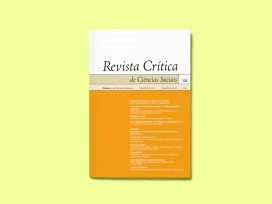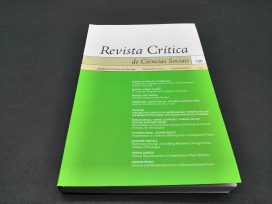Abstracts Revista Crítica 74 (2006)
Vivian Liska
Making It Mean and Making It Matter. Modernism for the 21st Century
Taking as its starting point the mysterious and ambiguous Kafka figure of Odradek, the essay reflects upon what might be a modernism for the 21st century. It argues that, contrary to the death certificate issued by the postmodernist tide, we are currently witnessing a process of expansion through the inclusion of other players, cultures and locations into the modernist pantheon on the one hand, and the undoing of borders with different registers, poetics and literary periods and movements on the other.
Catarina Martins
Textual Dis-solutions in the Modernist House of Mirrors
According to the notion of Modernism as a critical reaction to post Enlightenment modernity, the totalitarian epistemological model of modern reason annihilated the individual through crystallized schemata that mediate the relation between the subject and the world. Modernism would be an attempt to save the individual, or an identity seeking process which dismantles established constructions of reality and produces alternative narratives of the whole that preserve the individual. Modernism becomes a self conscious aesthetic rationality that tends to a mode of discourse that aims at contouring the subject in its relation with the world: the Essay. In German speaking narrative fiction of the early 20th century the confluence of Modernism and essayism led to interesting textual hybrids. Here, multiple kinds of mirror effects equate the dissolution of traded epistemological and aesthetic paradigms with new solutions for a fictional rewriting of reality and the self.
Inês Lage Pinto Basto
The Fairest Mirror of All: Alberto Caeiro, Leopold Bloom, Pessoa¹s Portugal and Joyce¹s Ireland
In a memorable depiction of himself as a house of mirrors, Fernando Pessoa leaves us in an empty room where the looking glass itself becomes the author¹s “single previous reality,” the materialization of his inaccessible core, the only tangible certainty common to all the distorted images that are reflected. As Snow White becomes both a final sublimation of the Evil Queen¹s usurping beauty, and the embodiment of an original legitimate beauty, so Pessoa¹s “numberless mirrors” and Joyce¹s “cracked looking glass” become, along with all “realities,” fragmented reflections of a single original reflecting surface. Speculating around the mirror in “Little Snow White,” I will take Caeiro, Bloom, Pessoa¹s Spiritual Empire and Joyce¹s Caricature of the Serious World, as personal, national and global congregating devices strategically positioned at the origin of all “reflections” and made out to stand for their absent “previous reality.”
Houston Baker, JR
Modernity and the Transatlantic Rupture: A Meditation on the Slave Trade
Modernity¹s global applicability is most clearly marked by the Transatlantic Slave Trade in which millions of Africans were forcefully deported to the “New World.” Reading the economics of the trade and its diasporic implications yields a realization of the importance of sugar as a commodity and the plantation as means of production. Commencing with a memoiristic prelude centered in Coimbra, Portugal, the argument expands to an explanation of slavery in the mainland colonies of North America and its implications for race in the United States today.
Ana Luísa Saraiva
Inverting the Middle Passage: Richard Wright¹s Return to Africa
In this paper, I intend to examine how Richard Wright¹s conflictual sense of “return” to Africa in Black Power revolutionizes and subverts the “Middle Passage” on a voluntary voyage to the origins that never really were. His fragmented authorship guides the readers through a personal incursion in the many senses of Modernity and provides us with a valuable insight on the notion of a “common fate”. But any sense of community here is never free of ambiguity for it is closely tied to “race and
“identity.” Black Power marks a very significant change in Wright¹s literary output as it becomes largely non fictional. However, this second phase of his career contains a crucial paradox: while Wrights turns himself to the exterior, to a “global” world, he simultaneously tries to inscribe himself as a reference to the place he could never fully escape: Africa. In Black Power, the Duboisian “color line” is given other dimensions.
Paula Elyseu Mesquita
Dressed to Kill: The Sex of the Wars in Cather and Faulkner
This is a comparative reading of two war novels: One of Ours, by Willa Cather, and
The Unvanquished, by William Faulkner. The comparison addresses gender construction and gender subversion in the socially disruptive context of military conflict. Focusing mainly on two characters, Claude Wheeler and Drusilla Hawk, I intend to investigate the war in the novels as a space chosen by both authors to test out the young characters¹ gender (in)conformity and the extent of their ability to challenge social and religious convention. Since both join the army voluntarily, the war appears as a site for social destruction as much as for individual construction. I am interested in the fact that both writers chose a soldier figure of the opposite sex and will be discussing the reasons for such options and possible theoretical implications.
Susan Stanford Friedman
One Hand Clapping: Colonialism, Postcolonialism, and the Spatio/Temporal Boundaries of Modernism
The essay challenges the prevailing view that the West invented modernity and modernism, while the rest imitated the West in derivative forms. It considers the cityscapes of Shanghai and Manhattan to upset common equations of modernization with Westernization and draws on comparative world history and postcolonial studies to offer new ways of thinking about the spatio/temporal boundaries of modernity/modernism. Cassatt¹s translations of Japanese woodblock prints, Picasso¹s adaptations of African art, and the Sudanese writer Tayeb Salih¹s rewriting of Conrad are juxtaposed to demonstrate transcontinental cultural flows in the formation of different modernisms.
Maria José Canelo
The Geopolitical Dimension of Modernism – Mexican Countercultures in California
The Great Depression constitutes a specific historical and cultural configuration that substantially reshapes modernist forms. The focus of my paper is American Popular Front intellectual Carey McWilliams¹s writings on U.S. cultures. His critical work highlights the geopolitical dimension of modernism, suggesting that modernity did not foster the same kind of experience all around the United States: the crisis brought about by the Depression created an opportunity to show that when modernization failed, instances of unequal development emerged within U.S. society itself, which conventional modernist forms were unable to represent. McWilliams worked with ethnic communities in California and the way he perceived difference in their cultures is similar to what many critics now term “countercultures of modernity.” My analysis will also draw on Michael Denning¹s notion of “social modernism,” which helps us to perceive in how far modernism should be reconceived as a discursive and historical field, a cultural phenomenon in broad terms.
Rosa Maria Martelo
Anticipations and Retrospectives: Portuguese Poetry in the Last Decades of the Twentieth-first Century
In view of the return to textualization in the 960¹s – a tendency that is also to be observed in the French and Spanish contexts – the poets¹ reaction in the next few decades is often quite strong. The question to be asked is whether there is a fundamental difference between these two positions, which seem to give rise to apparently distinct poetics. Is there in the second half of the twentieth century a moment in which we might speak of a break? In this paper I try to show that, rather than producing a rupture, the emerging poetics of the 960¹s consolidates a tradition of modernity in its more radical aspect, whereas the next poetics prefers to realign with the most remote tradition of modernity, in Baudelaire¹s sense, Even though we face two different kinds of dialogue with the tradition, in both cases, it seems, the tradition is retrieved in such a way that the notion of rupture is out of the question.
Published 21 July 2006
Original in Portuguese
Contributed by Revista Crítica de Ciências Sociais © Revista Crítica de Ciências Sociais Eurozine
PDF/PRINTNewsletter
Subscribe to know what’s worth thinking about.



